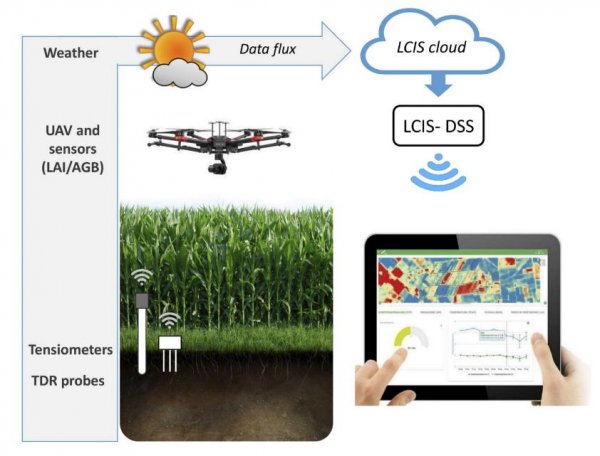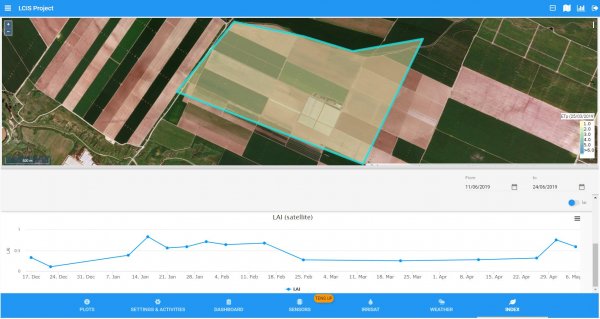Espositori 2019
- 3D PRINTING
- ART
- EDUCATION
- HOME AUTOMATION
- INTERNET OF THINGS
- KIDS & EDUCATION
- RECYCLING & UPCYCLING
- ROBOTICS
- SCIENCE
- YOUNG MAKERS (< 18)
- BIOLOGY
- GAMES
- ARTIFICIAL INTELLIGENCE
- OPEN SOURCE
- NEW MANUFACTURING
- FABRICATION
- WELLNESS & HEALTHCARE
- ENERGY & SUSTAINABILITY
- FOOD & AGRICULTURE
- 3D SCANNING
- CULTURAL HERITAGE
- AEROSPACE
- HACKS
- MUSIC & SOUND
- ARTISANS & NEW CRAFT
- FASHION & WEARABLES
- DRONES
- STEAM PUNK
- ARDUINO
- CROWDFUNDING
CNR4All UN SISTEMA AVANZATO LOW COST PER IL SUPPORTO ALL’IRRIGAZIONE DI PRECISIONE A SCALA AZIENDALE- LCIS
L'obiettivo generale del progetto LCIS è quello di integrare in campo agricolo, strumenti di ricerca innovativi e cyber infrastructure (web-based DSS) per affrontare le nuove sfide sociali e climatiche al fine di garantire la sicurezza alimentare e nutrizionale attraverso l’ottimizzazione dell’uso della risorsa idrica (WUE). Il progetto LCIS (R&D project Italia-Israele) si basa sui seguenti obiettivi: Ob.1. Sviluppo di un sistema real-time di supporto alle decisioni (LCIS-DSS) per la gestione irrigua alla scala aziendale. Ob.2. Sviluppo di un approccio low-cost basato sulla spettroscospia d’immagine per supportare le pianificazioni realizzate dal DSS. Ob.3. Esaminare il DSS e le sue routine in applicazioni reali, attraverso la calibrazione su informazioni derivanti da dispositivi ad alta risoluzione.
Il sistema LCIS-DSS è composto da tre tools capaci di affrontare la gestione irrigua attraverso sensori di campo (W-Tens), telerilevamento (IRRISAT) e modelli fisicamente basati (W-Mod). Il grosso vantaggio è la capacità di adattamento del sistema a condizioni pedoclimatiche differenti, potendo lavorare a diversa scala spaziale e di conoscenza del territorio monitorato. Il sistema di gestione dell'irrigazione (Ob.1) è stato testato su mais in Italia (Bonfante et. al., 2019) e su diverse colture (es. patate) in Israele, mentre l’ottimizzazione dell’approccio low cost (es. RGB camera) basato sulla spectroscopia è stato testato anche su Vite (Brook et al., 2019 - under review).
Il sistema LCIS-DSS è composto da tre tools capaci di affrontare la gestione irrigua attraverso sensori di campo (W-Tens), telerilevamento (IRRISAT) e modelli fisicamente basati (W-Mod). Il grosso vantaggio è la capacità di adattamento del sistema a condizioni pedoclimatiche differenti, potendo lavorare a diversa scala spaziale e di conoscenza del territorio monitorato. Il sistema di gestione dell'irrigazione (Ob.1) è stato testato su mais in Italia (Bonfante et. al., 2019) e su diverse colture (es. patate) in Israele, mentre l’ottimizzazione dell’approccio low cost (es. RGB camera) basato sulla spectroscopia è stato testato anche su Vite (Brook et al., 2019 - under review).
Italy
From CNR: PhD. Antonello Bonfante, PhD Eugenia Monaco, PhD Piero Manna, Dr. Maurizio Buonanno, Dr. Andrea Esposito and Giovanni Cantilena From Israeli partner: Prof. Anna Brook, Dr. Keren Salinas, Emanuel Levitin, Ron Segal
Antonello Bonfante (male): He is a Researcher at CNR-ISAFOM (since 2011) and he was contract Professor in Pedology at University of Salerno (Dep. of Chemistry and Biology, Degree course in Environmental Science, 2013-2018). He got the degree in Agricultural Science and Technology (110/110 and praise) in March 2002 the degree of Doctor of Philosophy in “Valorization and management of the Agro-Forest Resources” in applied Pedology, at the University of Naples “Federico II”, discussing the thesis entitled "Determination of protecting capability of soils to the agricultural nitrate pollution: comparison between simulation models", which earned him the PhD award AISSA (Italian Association of the Agricultural Science Societies) (2006). He is president of third division (Soil use and management) od Italian Society of Soil Science (SISS) and member of the European Geoscience Union (EGU) (since 2009) and the Italian Society of Pedology (SIPE). Currently he is scientific manager for CNR-ISAFOM of following projects:
(i) LCIS project “An advanced Low Cost system for farm Irrigation Support” (www.lcis-project.com) a joint Italian-Israeli R&D projects in the area of “agriculture and food science". "Fifteenth Call for Proposals for Joint R&D Projects – 2017, industrial track" funded by Ministry of Foreign Affairs and International Cooperation General Directorate for Country Promotion (MAECI) - Italian Republic and Israel Innovation Authority Ministry of Economy.
(ii) RURAL project “RidUrre la distanza tra RicercA e imprese agricoLe (RURAL)” PSR Campania 2014-2020. Meas. 16.5 - Tipologia di intervento16.5.1: Azioni congiunte per la mitigazione dei cambiamenti climatici e l’adattamento ad essi e per pratiche ambientali (in corso; CNR-ISAFOM Prot. 0052346/2017).
(iii) Associated principal Investigator, PRIN 2017, "Influence of Agro-climatic conDitions on the microbiome and genetic expression of grApevines for the Production of red wines: a mulTisciplinary approach (ADAPT)" (36 mesi)
Moreover, he is involved in the European H2020 project LANDSUPPORT “Development of Integrated Web-Based Land Decision Support System Aiming Towards the Implementation of Policies for Agriculture and Environment” - LANDSUPPORT - Grant Agreement N 774234” (call RUR-2016-2017) (www.landsupport.eu) on two principal tasks: crop adaptation and soil nutrients modelling.
Currently he is co-guest editor of:
• Special issue “New Frontiers of Multiscale Monitoring, Analysis and Modeling of Environmental Systems via Integration of Remote and Proximal Sensing Measurements” MDPI Remote Sensing (IF 3.4). (http://www.mdpi.com/journal/remotesensing/special_issues/multiscale_rs).
• Research Topic in Frontiers in Environmental Science: “Biogeosciences and Wine: The Management and Environmental Processes that Regulate the Terroir Effect in Space and Time” (https://www.frontiersin.org/research-topics/10197/biogeosciences-and-wine-the-management-and-environmental-processes-that-regulate-the-terroir-effect)
Research: Attention was paid to the analysis and improving of knowledge and use of soil properties and processes. Dr. Bonfante has always posed his attention to combine the standard qualitative evaluation approaches on soil land use (Land Evaluation) with quantitative ones (Simulation modelling application), in order to incorporate in dynamic way, the soil processes (e.g. soil water balance) affecting the soil-plant and atmosphere system (SPA) at different spatial scale (e.g. farm, district, region). Two are the most important fields of analysis as i) Viticulture terroir mapping and analysis and ii) Evaluation of climate change effects on crop land use in regards of food security and local farm communities’ resilience.
He is main or co-author of 31 research papers (from 2009 to 2019), with an H index Scopus of 11. (orcid.org/0000-0002-0963-1904).
In the 2015 he was invited to write the chapter “Climate change effects on the suitability of an agricultural area to maize cultivation: Application of a new hybrid land evaluation system” for the prestigious journal Advances in Agronomy (Bonfante et al., 2015, Adv. Agron. 133, 33–69). More recently, in the 2017, he was invited by IUSS (Internationa Union of Soil Sciences) president, prof. Rattan Lal, to contribute to IUSS book “Soil and Sustainable Development Goals”, with the chapter “Soil science solutions for advancing SDG 2 towards resilient agriculture” published at July 2018 on Catena Soil Sciences, E. Schweizerbart'sche Verlagsbuchhandlung (Bonfante et al., 2018)
For further scientific information https://www.researchgate.net/profile/A_Bonfante
(i) LCIS project “An advanced Low Cost system for farm Irrigation Support” (www.lcis-project.com) a joint Italian-Israeli R&D projects in the area of “agriculture and food science". "Fifteenth Call for Proposals for Joint R&D Projects – 2017, industrial track" funded by Ministry of Foreign Affairs and International Cooperation General Directorate for Country Promotion (MAECI) - Italian Republic and Israel Innovation Authority Ministry of Economy.
(ii) RURAL project “RidUrre la distanza tra RicercA e imprese agricoLe (RURAL)” PSR Campania 2014-2020. Meas. 16.5 - Tipologia di intervento16.5.1: Azioni congiunte per la mitigazione dei cambiamenti climatici e l’adattamento ad essi e per pratiche ambientali (in corso; CNR-ISAFOM Prot. 0052346/2017).
(iii) Associated principal Investigator, PRIN 2017, "Influence of Agro-climatic conDitions on the microbiome and genetic expression of grApevines for the Production of red wines: a mulTisciplinary approach (ADAPT)" (36 mesi)
Moreover, he is involved in the European H2020 project LANDSUPPORT “Development of Integrated Web-Based Land Decision Support System Aiming Towards the Implementation of Policies for Agriculture and Environment” - LANDSUPPORT - Grant Agreement N 774234” (call RUR-2016-2017) (www.landsupport.eu) on two principal tasks: crop adaptation and soil nutrients modelling.
Currently he is co-guest editor of:
• Special issue “New Frontiers of Multiscale Monitoring, Analysis and Modeling of Environmental Systems via Integration of Remote and Proximal Sensing Measurements” MDPI Remote Sensing (IF 3.4). (http://www.mdpi.com/journal/remotesensing/special_issues/multiscale_rs).
• Research Topic in Frontiers in Environmental Science: “Biogeosciences and Wine: The Management and Environmental Processes that Regulate the Terroir Effect in Space and Time” (https://www.frontiersin.org/research-topics/10197/biogeosciences-and-wine-the-management-and-environmental-processes-that-regulate-the-terroir-effect)
Research: Attention was paid to the analysis and improving of knowledge and use of soil properties and processes. Dr. Bonfante has always posed his attention to combine the standard qualitative evaluation approaches on soil land use (Land Evaluation) with quantitative ones (Simulation modelling application), in order to incorporate in dynamic way, the soil processes (e.g. soil water balance) affecting the soil-plant and atmosphere system (SPA) at different spatial scale (e.g. farm, district, region). Two are the most important fields of analysis as i) Viticulture terroir mapping and analysis and ii) Evaluation of climate change effects on crop land use in regards of food security and local farm communities’ resilience.
He is main or co-author of 31 research papers (from 2009 to 2019), with an H index Scopus of 11. (orcid.org/0000-0002-0963-1904).
In the 2015 he was invited to write the chapter “Climate change effects on the suitability of an agricultural area to maize cultivation: Application of a new hybrid land evaluation system” for the prestigious journal Advances in Agronomy (Bonfante et al., 2015, Adv. Agron. 133, 33–69). More recently, in the 2017, he was invited by IUSS (Internationa Union of Soil Sciences) president, prof. Rattan Lal, to contribute to IUSS book “Soil and Sustainable Development Goals”, with the chapter “Soil science solutions for advancing SDG 2 towards resilient agriculture” published at July 2018 on Catena Soil Sciences, E. Schweizerbart'sche Verlagsbuchhandlung (Bonfante et al., 2018)
For further scientific information https://www.researchgate.net/profile/A_Bonfante
B1 (pav. 7)





















































































